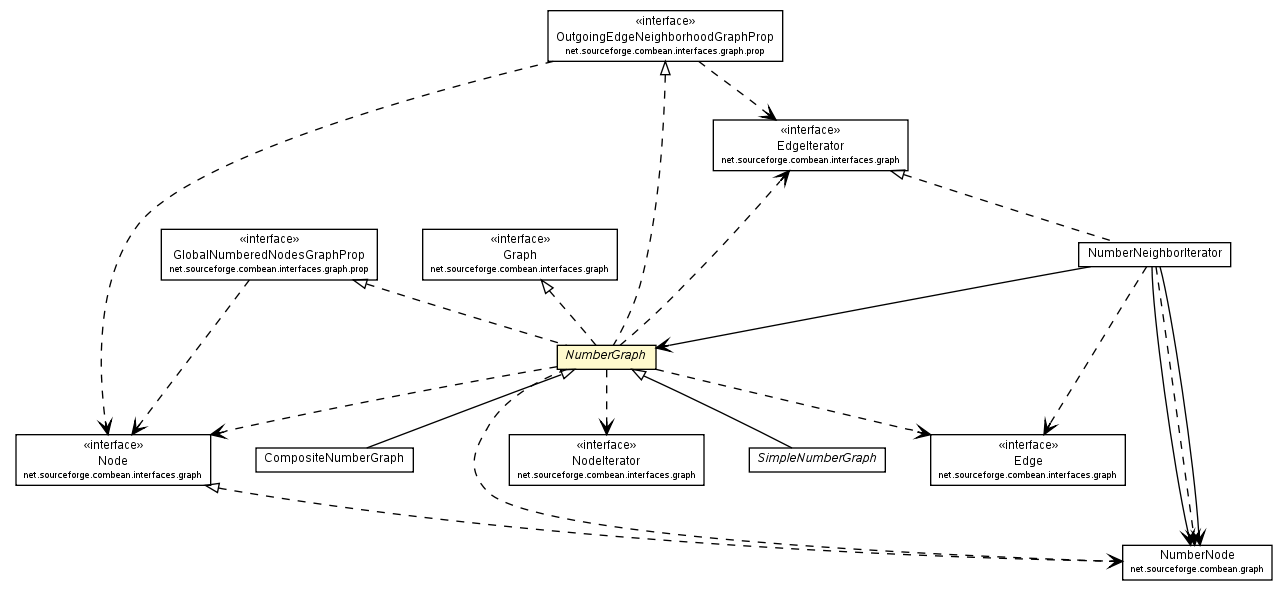
|
|||||||||
| PREV CLASS NEXT CLASS | FRAMES NO FRAMES | ||||||||
| SUMMARY: NESTED | FIELD | CONSTR | METHOD | DETAIL: FIELD | CONSTR | METHOD | ||||||||

java.lang.Objectnet.sourceforge.combean.samples.simplegraphs.NumberGraph
public abstract class NumberGraph
This class represents a graph where every node is identified by a long-value.
| Field Summary | |
|---|---|
static int |
FIRSTNODE
The number of the first node in the graph. |
static int |
NOSUCHNODE
The virtual node number if no such node exists. |
| Fields inherited from interface net.sourceforge.combean.interfaces.graph.prop.GlobalIndexedNodesGraphProp |
|---|
UNDEFINED_NODE |
| Constructor Summary | |
|---|---|
NumberGraph()
|
|
| Method Summary | |
|---|---|
protected abstract int |
calcNextNode(int sourceNodeNum,
int minNodeNum)
Template method for calculating neighbors. |
boolean |
contains(NumberNode v)
Check whether a given node is contained in the graph. |
NumberNode |
convertNumToNode(int num)
Create a node in the graph.given its number |
boolean |
empty()
Check if the graph is empty. |
NodeIterator |
getAllNodesIterator()
Return an iterator for all nodes in the graph |
Class |
getEdgeClass()
|
Node |
getFirstNode(Edge e)
Return the first node of an edge. |
EdgeIterator |
getIncidentEdges(Node v)
Return an iterator for the local neighborhood of v |
Node |
getNode(int index)
Returns the node with the given index. |
Class |
getNodeClass()
|
int |
getNodeNumber(Node v)
Get the number of a given node. |
Node |
getOtherNode(Edge e,
Node v)
Given an edge and an incident node, return the other node of the edge |
EdgeIterator |
getOutgoingEdges(Node v)
Get all outgoing edges of a given node |
Node |
getSecondNode(Edge e)
Return the second node of an edge. |
protected int |
nextNode(NumberNode startNode,
NumberNode currNode)
Helps NumberNodeIterators to calculate the next node when iterating through neighbors. |
| Methods inherited from class java.lang.Object |
|---|
clone, equals, finalize, getClass, hashCode, notify, notifyAll, toString, wait, wait, wait |
| Methods inherited from interface net.sourceforge.combean.interfaces.graph.prop.GlobalNodesGraphProp |
|---|
getNumNodes |
| Field Detail |
|---|
public static final int FIRSTNODE
public static final int NOSUCHNODE
| Constructor Detail |
|---|
public NumberGraph()
| Method Detail |
|---|
public Class getEdgeClass()
getEdgeClass in interface Graphpublic Class getNodeClass()
getNodeClass in interface Graphpublic NodeIterator getAllNodesIterator()
GlobalNodesGraphProp
getAllNodesIterator in interface GlobalNodesGraphPropGlobalNodesGraphProp.getAllNodesIterator()public Node getNode(int index)
GlobalIndexedNodesGraphProp
getNode in interface GlobalIndexedNodesGraphProppublic int getNodeNumber(Node v)
GlobalNumberedNodesGraphProp
getNodeNumber in interface GlobalNumberedNodesGraphPropv - the node for which the number shall be returned.
public final NumberNode convertNumToNode(int num)
num - the number of the node to be created
public final EdgeIterator getIncidentEdges(Node v)
NeighborhoodGraphProp
getIncidentEdges in interface NeighborhoodGraphPropv - the node for which the neighborhood shall be given.
public EdgeIterator getOutgoingEdges(Node v)
OutgoingEdgeNeighborhoodGraphProp
getOutgoingEdges in interface OutgoingEdgeNeighborhoodGraphProppublic final Node getFirstNode(Edge e)
NeighborhoodGraphProp
getFirstNode in interface NeighborhoodGraphPrope - the edge
public final Node getSecondNode(Edge e)
NeighborhoodGraphProp
getSecondNode in interface NeighborhoodGraphPrope - the edge
public final Node getOtherNode(Edge e,
Node v)
NeighborhoodGraphProp
getOtherNode in interface NeighborhoodGraphPrope - the given edgev - the give node
protected int nextNode(NumberNode startNode,
NumberNode currNode)
startNode - the start node of the NumberNeighborIteratorcurrNode - the current node of the NumberNeighborIterator or null is this
is the first iteration
protected abstract int calcNextNode(int sourceNodeNum,
int minNodeNum)
sourceNodeNum - minNodeNum -
nextNode(NumberNode, NumberNode)public final boolean contains(NumberNode v)
v - the node to be checked
public final boolean empty()
|
|||||||||
| PREV CLASS NEXT CLASS | FRAMES NO FRAMES | ||||||||
| SUMMARY: NESTED | FIELD | CONSTR | METHOD | DETAIL: FIELD | CONSTR | METHOD | ||||||||